|
FOOD AND AGRICULTURE IN TIMES OF CRISES
Report from the high-level event in Brussels
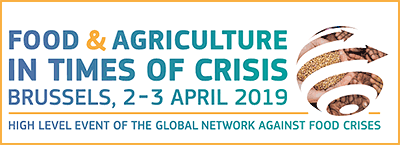
Despite the global decrease in the number of people who face acute hunger over the past, the main drivers of food crises are still present and continue to affect millions of people worldwide. This is one of the key messages of the 2019 Global Report on Food Crises. The report was launched at the high-level event, “Food and Agriculture in Times of Crises – Working Better Together for Long Term Solutions,” hosted by the European Commission in cooperation with the Global Network Against Food Crises from 2-3 April 2019.
The 2019 Global Report on Food Crises is the product of collaboration between fifteen organisations in the international humanitarian and development community, which resulted in a milestone achievement of reaching international consensus on food crises data. Four of these organizations, the European Union, FAO, USAID, and World Food Programme (WFP), are members of the Global Donor Platform for Rural Development.
According to the report, more than 113 million people across 53 countries experiencing acute hunger and requiring urgent food, nutrition, and livelihoods assistance.” This number represents a slight improvement over the 124 million people presented in the 2017 Global Report on Food Crises; however, the latest report indicates that more than 100 million people have faced periods of acute hunger over the past three years.
With resolving conflict, zero hunger cannot be achieved
“It is time to not only diagnose the problem, but find solutions. Now is the time to act, not react,” said Neven Mimica, European Commissioner for International Cooperation and Development, in his welcome statement. The more than 400 representatives of the international humanitarian and development communities seized the opportunity to discuss the findings, messages, and implications of the 2019 GRFC in various sessions after the report’s presentation in order to promote collective reflections on the challenges and opportunities for effective action needed to eradicate food crises.
Persistent instability in conflict-ridden regions has been the primary drivers of food insecurity for the last three years, with 74 million people of those facing acute hunger due to conflict located in twenty-one countries. These numbers led Arif Husain, Chief Economist of the World Food Programme, to conclude at the launch event that, “without resolving conflict we won’t reach zero hunger”.
WEBLINK
 READ THE FULL STORY READ THE FULL STORY
# # #
“EMPOWER WOMEN, POWER TRADE”
A new initiative to strengthen women’s economic empowerment in LDCs
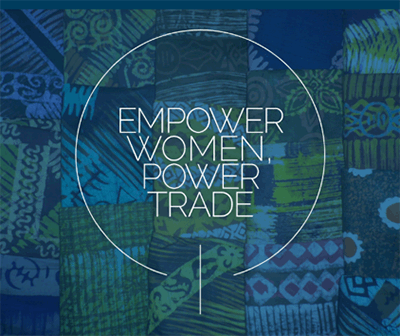
A new initiative aims at transforming the economic lives of women in the world’s 47 Least Developed Countries. Launched by the Enhanced Integrated Framework (EIF), it targets the socio-economic barriers to business that many women face, such as limited access to finance and inequitable laws and social norms that restrict their mobility and participation in trade. EIF’s Deputy Executive Director, Annette Ssemuwemba, officially announced the initiative on 23 March 2019 in the Creation of New Market Value by Women Entrepreneurs panel at the W20 Tokyo 2019. EIF is housed at the World Trade Organisation (WTO), a Global Donor Platform for Rural Development member.
Across LDCs, women continue to face constraints that limit their participation in global trade. This includes discriminatory laws and social norms related to women’s responsibilities and mobility, as well as barriers relating to information and finance that reduce access to opportunities. “Empower Women, Power Trade” focuses on female entrepreneurs and producers, cross-border traders and women-owned micro-, small- and medium-sized enterprises (MSMEs).
“Empower Women, Power Trade” will operate in the 47 LDCs, with emphasis on countries where EIF has ongoing projects or partnerships. Within the next 4 years, until 2022, it intends to make a change in the lives of 50,000 women.
LDCs in the driver seat
Adopting a holistic approach, the initiative will establish coordination and collaboration with LDC trade ministries to influence on policies that should improve women’s capacity to participate on and benefit from trade. This approach makes the initiative special as it focuses on trade-led sustainable development via institutional and policy work.
The initiative builds on strong support. Funding comes from several G20 countries, including Australia, Canada, Germany, France, Japan, South Korea, the United Kingdom, and the United States, who have given a US$10 million investment for the initiative’s four-year duration. This corresponds well with the role as investors, donors, and partners in development that the G20 intends to play in regards to closing the gender gap.
WEBLINK
 READ THE FULL STORY READ THE FULL STORY
# # #
AGRICULTURAL DEVELOPMENT POLICY:
A CONTEMPORARY AGENDA
An expert talk with Steve Wiggins looks at the potential of agriculture for development
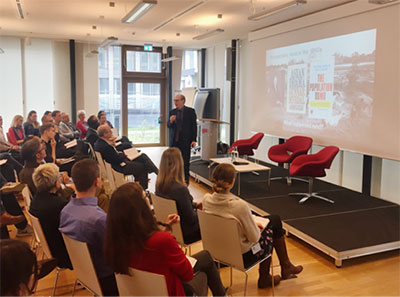
What makes an agricultural development policy contemporary? What are the key components for agriculture that feed current and future generations without overstretching planetary boundaries?
Questions like these were at the heart of a lecture by renowned academic and ODI’s Principal Research Fellow Steve Wiggins that was held on 10 April 2019 at GIZ’s offices in Bonn and drew an attendance of over fifty agricultural development experts. Wiggins delivered an expert talk framing the upcoming publication of the 3rd edition of GIZ and ODI’s “Agricultural development policy: a contemporary agenda”. This report will be published soon and is an update of a publication that was first introduced in 2013.
According to Wiggins, the experiences from Asia’s Green Revolution can be a positive message to Africa. He stated that the situation of some African countries resembles that of some Asian countries at the start of the Green Revolution. Positive transformations currently happening in rural Africa (e.g., new farmers, the adoption of new technologies, and solar pump miracles) can help people manage negative side effects of agriculture, such as the overuse of natural resources, and to meet new large challenges, such as environmental concerns, food insecurity, and malnutrition.
Wiggins highlighted three policy pointers that deserve to be considered by the agricultural development community. First, the successful experience of Asian countries after the start of the Green Revolution demonstrates that there is cause for optimism in implementing policies and actions that work and therefore, the agenda should not be framed pessimistically. Second, straightforward approaches, policies, and projects that worked in advancing agricultural development policies have proven to be successful. These tried and trusted methods worked in the past and should not be discounted as they provide a wealth of experience from the last half century. Third, policies should be directed at resolving some of the big challenges that agricultural development faces, such as rural market failures, environmental sustainability, and climate change.
WEBLINK
 READ THE FULL STORY READ THE FULL STORY
# # #
POSITIONING IN A RAPIDLY EVOLVING CLIMATE CHANGE AND AGRICULTURE CONTEXT
3rd Meeting of the Thematic Working Group on Agriculture, Food Security, and Land Use
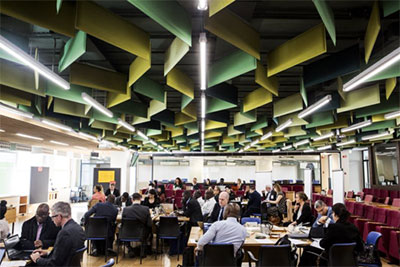
The Thematic Working Group (TWG) on Agriculture, Food Security and Land Use of the Nationally Determined Contributions Partnership (NDC-P) met for the third time in Rome at the Food and Agriculture Organization of the United Nations (FAO) on 16-18 April. The three-day meeting brought together relevant stakeholders of NDC-P member countries that engage in and are interested in the TWG to take stock of the group’s progress and to strengthen their planning and implementing capacities for appropriate climate action in agriculture sectors.
In an open and engaging discussion, the TWG Secretariat and the working group members took stock of the implementation of their 2018 work plan, which included case studies, peer workshops, an eDiscussion group, and the presentation of the TWG’s work at COP24. All participants agreed now was the time to engage in more action, which would find its place in the work plan for 2019-2020.
Supporting NDC implementation with new insights and peer-to-peer exchange
In order to stay at the forefront of the changing climate action and agricultural landscape, the TWG aims at facilitating a peer-to-peer network for countries and international organisations to exchange knowledge, insights, experiences, and needs on climate change impacts and challenges. “We are not on track to achieve the Paris Agreement and the SDGs,” stated Alexander Jones, Climate and Environment Division Director at FAO, and continued: “What we need is increased ambition and action to reach goals in the next twelve years as well as increased exchange and learning from each other. The exchange is fostered by this working group.”
With a focus on the implementation level, TWG members presented case studies on current projects that contribute to NDCs. Good examples came from Morocco, where a Green Climate Fund approved project facilitates the development of argan orchards in degraded environments, and from Zimbabwe, where a students’ agriculture innovation and development programme maintains a Climate Smart Agriculture Manual developed by youth agriculture networks in agricultural colleges.
Other presentations looked at policy levels. Marjanneke Viijke of the Copernicus Institute at Utrecht University offered new insights on NDC coordination mechanisms at national and subnational levels. The research she had carried out on policy coherence around climate and food security in developing countries and its effect on the poorest and most vulnerable demonstrates that the need for coherence and coordination is greater under current climate action and development networks, as climate and food security are integrated in these intertwined goals. At the same time, the coordination mechanism is fragmented, as there are often different focal points within a single ministry or different ministries. The TWG agreed to collaborate on joint activities and established a timeline for 2019 and 2020, which is in alignment with the work and timelines of various international climate action working groups, such as Koronivia Joint Work on Agriculture (KJWA), the UNFCCC Subsidiary Body for Scientific and Technological Advice (SBSTA), the meeting of the UN Secretary General, and COP25. Furthermore, new initiatives were proposed, including arranging physical meetings for peer-to-peer exchange on the sidelines of climate meetings and summits, as well as a regional and language-specific member meeting for exchanging best practices, beginning with an African Francophone meeting.
WEBLINK
 READ THE FULL STORY READ THE FULL STORY
# # #
INFOGRAPHIC OF THE MONTH
Global Hunger Index confirms West Africa’s progress
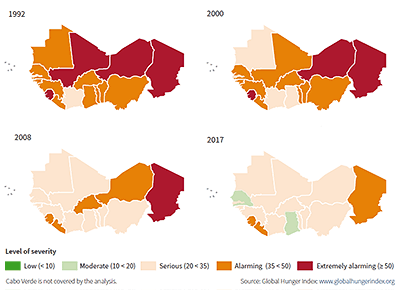
While word hunger is on the rise again, West Africa continues to make progress in fighting against food insecurity and malnutrition. This encouraging news confirmed by the latest Global Hunger Index is taken from the recently released selection of maps prepared for the high-level event on “Food and agriculture in times of crisis”, organised by the European Commission under the auspices of the Global Network against Food Crises, held on 2-3 April 2019 in Brussels.
The selection of 38 maps have been prepared by the Sahel and West Africa Secretariat (SWAC/OECD) to the Network’s reflection on “Working better together for long-term solutions”. In addition, more than 400 maps and 100 charts (in English and French, and in three formats – Web, HD and PDF) are available on the SWAC’s online map library.
WEBLINK
 LEARN MORE ABOUT THE KEY FINDINGS LEARN MORE ABOUT THE KEY FINDINGS
# # #
MEMBERS AND PARTNERS STRATEGIES, PUBLICATIONS AND EVENTS
NEW PUBLICATIONS
2019 GLOBAL REPORT ON FOOD CRISES
The third annual Global Report on Food Crises highlights the plight of millions of people who must fight every day against acute hunger and malnutrition. The report also points the way towards solutions that can rebuild lives and livelihoods in communities around the world.
 WEBLINK WEBLINK
EU ACHIEVEMENTS IN FOOD AND NUTRITION SECURITY AND SUSTAINABLE AGRICULTURE, 2014-2018
This publication highlights how the EU is supporting countries and institutions to address numerous challenges facing food security, improved nutrition, and sustainable agriculture, and to seize opportunities to further their development.
 WEBLINK WEBLINK
GUIDELINES FOR IMPACT EVALUATION OF LAND TENURE AND GOVERNANCE INTERVENTIONS
The guidelines are the result of a partnership by IFAD and GLTN, and in consultation with the Global Donor Working Group on Land, to improve the tools to evaluate land tenure and governance interventions.
 WEBLINK WEBLINK
BECAUSE WOMEN MATTER
Designing interventions in food, nutrition, and agriculture that allow women to change their lives based on the EU's 2015 framework for addressing gender equality in EU External Relations, the Gender Action Plan 2016–2020 (GAP II).
 WEBLINK WEBLINK
AGRICULTURAL DEVELOPMENT POLICY: A CONTEMPORARY AGENDA
The 2nd edition of the report on Agricultural Development: A Contemporary Agenda”, released by Platform member Deutsche Gesellschaft für Internationale Zusammenarbeit (GIZ) in cooperation with ODI, co-authored by Steve Wiggins (ODI)
 WEBLINK WEBLINK
EVENTS
Sunday, 5 May 2019 | Metz, France
G7 Environment Ministerial Meeting
Topic: Fighting inequality by protecting biodiversity and climate
 WEBLINK WEBLINK
Thursday, 9 May 2019 | Paris, France
G7 Gender Equality Ministerial Meeting
Topic: "Make gender equality a global cause.“
 WEBLINK WEBLINK
Saturday, 11 May 2019 | Niigata, Japan
G20 Agriculture Ministers' Meeting
 WEBLINK WEBLINK
Monday, 13 May 2019 | Kyoto, Japan
Global Landscape Forum 2019
 WEBLINK WEBLINK
Wednesday, 15 May 2019 | Addis Ababa, Ethiopia
8th CGIAR System Council Meeting
 WEBLINK WEBLINK
Thursday, 16 May 2019 | Paris, France
G7 Health Ministerial Meeting
Topic: Ensuring health care for all
 WEBLINK WEBLINK
Monday, 20 May 2019 | Paris, France
OECD Forum 2019: World in Emotion
 WEBLINK WEBLINK
Wednesday, 22 May 2019 | Paris, France
2019 OECD Ministerial Council Meeting
 WEBLINK WEBLINK
NEWS FROM THE SECRETARIAT
Annual General Assembly 2019 | 19-21 June, Zurich/Switzerland
The Annual General Assembly (AGA) 2019 of the Global Donor Platform for Rural Development is hosted by the Swiss Agency for Development and Cooperation (SDC) and will take place from 19-21 June 2019 in Zurich/Switzerland. After many years of thematically focused Annual General Assemblies, this year's meeting will be a unique Members’ only retreat. It will foster a rich introspective about donor issues leveraging the unique role of the Platform and its members in the rural development space. Please find the current agenda and a link to register here:
 AGA 2019 REGISTRATION AGA 2019 REGISTRATION
Members Only Tool Box
As part of the Platform’s new communication strategy, the Secretariat has developed a virtual toolbox with helpful documents, reports and graphic files around the Global Donor Platform. The first version of this toolbox was distributed by the beginning of April. In case you have not received the toolbox, have questions on its use or comments, please contact the Secretariat:
 MAIL TO SECRETARIAT MAIL TO SECRETARIAT
|